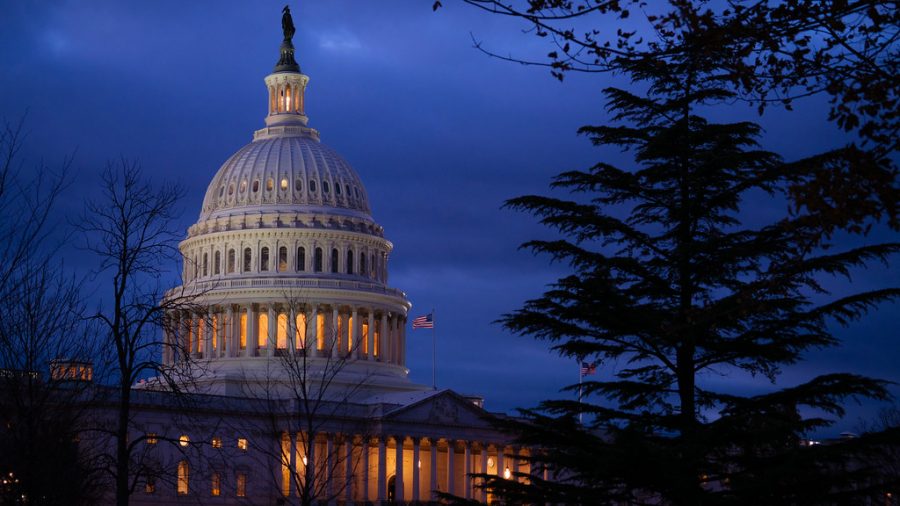Impeachment is Dying: How Can it be Saved?
The U.S. Capitol Building is the symbolic heart of American democracy, where lawmakers are supposed to protect the Constitution from all enemies foreign and domestic. On Feb. 6, 43 Senate Republicans failed to defend the Constitution by voting to acquit Donald Trump in his second impeachment trial. Trump’s acquittal has greatly damaged the process of impeachment, leaving the door open for federal political officials to commit heinous crimes without consequences.
Glass shattered. Brutalized police. Death in the halls of the U.S. Capitol.
America watched in horror on Jan. 6 as thousands of domestic terrorists–bringing Trump flags, MAGA hats, assault rifles and machetes–stormed the Capitol, disrupting the certification of the Electoral College results, which would, later the next day, confirm Joe Biden as the next President of the United States. Conservatives and liberals alike were in shock in the wake of this unprecedented attack. However, as the dust settled, there was only one man to blame for the assault: President Donald J. Trump.
It is impossible to deny Trump’s critical role in the insurrection. On that day, America should have dumped Trump and repudiated him as a leader. Yet Republican senators and party leaders still continue to pledge their loyalty to him.
The Senate Republicans were very much still under Trump’s control throughout the course of the lightning-fast second impeachment trial, which lasted just six days. Despite overwhelming evidence presented by the House impeachment managers, and a bungled defense by Trump’s legal team, Trump was ultimately acquitted of all charges. The final tally was 57 votes to convict versus 43 nays. Just seven Republicans broke party lines to vote to convict the former president.
With Trump’s second acquittal, it has become more than apparent that the process of impeachment is dead. Impeachment is designed to hold government officials accountable for their actions. No political official is above the law, and that was exactly why the Founding Fathers put this provision into the Constitution. There is no doubt that Trump was guilty of inciting the insurrection that left five dead at the Capitol Building. Not only did America see the event as it played out, but Trump himself had invited the mob to Washington via Twitter before directing them to march to the Capitol in a speech earlier that day. Even Senate Minority Leader Mitch McConnell admitted in a speech following the impeachment trial that “President Trump is practically and morally responsible for provoking the events of [Jan. 6].” However, this speech lacked meaning since McConnell voted to acquit Trump.
Therein lies the death of impeachment. Many Republicans who did not vote to convict did so out of the belief that a former political official could not be impeached or tried by the Senate. This argument was taken on by McConnell as well, despite advice from constitutional lawyers that the trial was indeed valid and constitutional.
However, the Republican senators’ argument leaves a serious and potentially deadly loophole open. If a former political officer cannot be impeached, then that officer could commit any heinous crime in their last days of office and face no consequences from the federal government. Any disgruntled president could try to disrupt our democracy in their last days of office and get away with it, just as Trump did.
Surprisingly enough, the second Trump impeachment trial had the most bipartisan verdict of any impeachment trial of a president. This could be cause for celebration for some, but it also highlights a major issue. Only seven of 50 Republicans voted to convict Mr. Trump even when many Republicans admitted he was guilty of the crimes. Furthermore, the recent trial will likely remain the most bipartisan impeachment trial in our nation’s history. Due to the nature of our two-party system, it will be virtually impossible for any president to be convicted in an impeachment trial moving forward.
The verdict of the second Trump impeachment trial essentially increased the power of the president while decreasing the power Congress has over the president. Moving forward, presidents will be above the law, a reality that our Founding Fathers would have dreaded. Fierce loyalty of one’s party towards one leader can result in unchecked politicians, forcing our nation away from its principles of truth and justice.
Although impeachment is temporarily worthless, it should not be abandoned. Impeachment must be reformed. The first step to reforming this broken system is to understand the root of the problem: senators. Senators cannot serve as effective jurors during an impeachment trial. Their biases and loyalties make them partial and ineffective jurors. The individuals who are best suited to make major decisions in an impeachment trial are those who dedicate their lives to studying and protecting the Constitution. Our Supreme Court justices are the protectors of truth and justice in the United States, and they are the most qualified to decide the verdict of an impeachment trial. Although the Supreme Court is supposed to be an apolitical entity, it also has the duty of protecting the Constitution, and it only seems natural that the court decides on the constitutionality of a political figure’s actions.
An effective impeachment process is critical to preserving our democracy. Former President Trump very nearly succeeded in forcefully destroying the democratic institution of free and fair elections. He was not punished for his crimes, and unless we have an effective method to hold despots like him accountable, there will be more Trumps and more Jan. 6-type events in the future. We need to take the steps now to preserve our democracy for years to come, and fixing a broken impeachment process is one of the first steps towards that hope.










